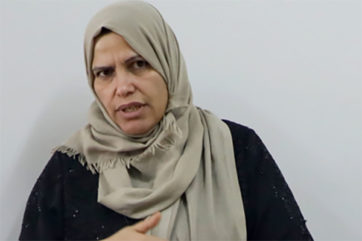
Dealing with trauma and anxiety is not new to Gazans, who face hardship on a daily basis. Families seek help at Shifa Hospital where they can get proper medication and treatment but the critical medicines they need are often beyond their reach because of their high cost.
Along with the help of our partners, Islamic Relief USA (IRUSA) was able to deliver 50,008 tablets of the antidepressant citalopram to Shifa Hospital’s psychiatric department. That has allowed the hospital to provide the critical medicine for free to needy patients being treated there.
Rana now can get proper treatment for both her son and her mother who suffer from depression and anxiety. Rana says they both experienced traumatic experiences that deeply affected their ability to cope. It broke Rana’s heart to see them suffer.
“My mother is a very beautiful soul. She was absent minded and so distracted. And my son was so miserable, it made me so sad and worried.”
Rana explains that her mother became sick after a series of traumatic incidents. For one, her son and his family went missing while trying to leave Gaza by boat after the Gaza war of 2014. They had hoped to find asylum in Sweden.
“She never stops thinking about him and his family,” says Rana. “Then she started talking strangely in a way we were not used to and sometimes she hit us hard even though she is weak.”
Rana’s mother refused to eat or drink and would suddenly scream for no reason. “My mom used to be so calm, so this strange behavior worried us.”
Rana finally brought her to Shifa Hospitalmother for treatment where she was diagnosed with extreme anxiety and was prescribed medicine to help her cope. “Thankfully, everything is much better since she started taking citalopram, which is used to treat anxiety and depression.” Rana also enrolled her mother in the hospital’s treatment program. The medicine her mother needs is only available with a prescription and is too expensive for Rana’s family, given their limited budget.
The donated medicines have removed that worry. “Since she has been on the medicine her strange behavior is gone and she doesn’t remember this period at all. Now we have her engaging, loving personality with us again, like the old days,” says Rana.
Rana’s son, Ali, is an 18-year-old high school student. “For so long, Ali seemed to be stuck in the mind of a 12-year-old.” The teenager didn’t talk or engage with others and appeared depressed. As he got older, she gave him pills to help him sleep.
“When he didn’t take the pills he would stay up late at night or go out and return home at four in the morning. He lost his sense of time and I would worry about him every day,” she adds.
Ali’s condition worsened. He failed in school and could not do simple tasks. He couldn’t tie his shoelaces or take a shower.
“In kindergarten, his teacher started complaining about his zero participation,” Rana says. “They told me that kindergarten isn’t for boys like him. Our government schools have a poor record dealing with normal kids so you can imagine what it was like for my son.”
The doctor at Shifa Hospital diagnosed Ali with depression and prescribed treatment and medicine. “The prescribed medicine was so expensive we couldn’t afford it,” Rana says, “But thankfully we got it here for free.”
Before taking the medicine, she says Ali never wanted to do anything. He had no appetite. His response to everything was no. “He was so stubborn, he drove me crazy,” she explains. “When he started taking citalopram to help treat his depression, everything changed for the better for him and for me!”







